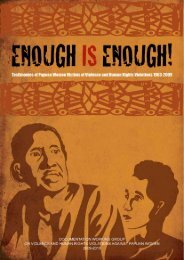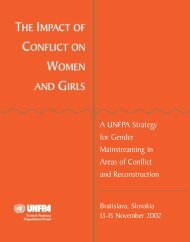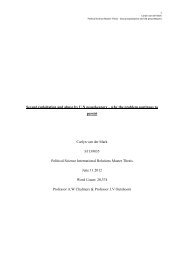IANSA [PDF, 2MB] - PeaceWomen
IANSA [PDF, 2MB] - PeaceWomen
IANSA [PDF, 2MB] - PeaceWomen
You also want an ePaper? Increase the reach of your titles
YUMPU automatically turns print PDFs into web optimized ePapers that Google loves.
2. Build women’s capacity to<br />
influence policy…<br />
…and support them to lead their own<br />
trainings<br />
During interviews and focus groups, women expressed the need for training on SALW as well as a strong interest<br />
in leading trainings and awareness-raising sessions themselves, both in their communities and with local<br />
authorities.<br />
■<br />
Support regional and local Trainings of Trainers (Tot) for women’s groups<br />
“As a group, we have to know more about the issue. If we<br />
are planning for this network, at the community level, I think<br />
as a group we have to know about this specific question,<br />
about the effects of guns on women, how we can put our<br />
efforts into it. We have to do capacity-building for us.” –<br />
Rural Women Development Society, OPT Focus Group<br />
Session, May 2011<br />
Women in all three countries reported the need to<br />
build their own capacities in dealing with such a sensitive<br />
issue as small arms, as interviews show. A<br />
women’s training of trainers (ToT) would:<br />
• Increase capacity of women and women’s organisations<br />
to inform and influence their governments<br />
and parliamentarians to improve national policy on<br />
armed violence reduction and small arms control<br />
• Ensure stronger implementation of UNSCR 1325<br />
through increasing women’s meaningful participation<br />
in, and awareness of, small arms control and<br />
disarmament<br />
Participants would lead sessions where they have<br />
expertise and knowledge to share. Trainings should<br />
include at least two police officers and/or government<br />
officials; and where possible, at least 50% of younger<br />
women (aged 40 and under) to strengthen an emerging<br />
group of women experts in the region. The inclusion<br />
of security sector and government officials will<br />
help to reach the goal of increasing civil society’s ability<br />
and capacity to positively influence national policies<br />
on small arms legislation and implementation, as<br />
well as increase coordination and cooperation<br />
between different sectors working on small arms control<br />
and gender. Participants will become powerful<br />
advocates in their meetings with relevant government<br />
officials and representatives.<br />
■<br />
Support women to lead trainings for professionals and local authorities dealing with violence<br />
“We can include the police in our project. We must target<br />
them. We have to discuss with them how to protect. Listen<br />
– who implements the laws? The policemen. We can do<br />
trainings with them.” – Messengers for Peace/YWCA,<br />
Jordan, Focus Group Session, May 2011<br />
Women also expressed interest in training others,<br />
including male community members, health care<br />
providers, police, judges and shelters and hotlines.<br />
Gun violence and violence against women are crosscutting<br />
issues that require the cooperation of a variety<br />
of sectors to be effectively dealt with. For example, a<br />
study conducted in Lebanon in 2010 found that inadequate<br />
training for health care professionals, and<br />
providers’ attitudes toward violence, limits the role<br />
that the health system plays in identifying violence<br />
against women and supporting survivors. Health<br />
workers could be trained and systems improved to<br />
better respond to violence against women and collect<br />
data. 80 Furthermore, women’s shelters, police and<br />
security should also be trained to identify cases of<br />
armed violence against women and respond to them.<br />
In order to reinforce the justice systems, judges, prosecutors<br />
and lawyers should also be trained. These<br />
trainings should be designed, led and organised by<br />
local women’s groups following their participation in a<br />
Training of Trainers initiative.<br />
Building on the results from the multi-country<br />
research (recommendation 1), trainings of trainers for<br />
women should include sessions on: SALW – terminology<br />
and concepts; Gender dimensions of SALW possession<br />
and use; Impact of guns on women;<br />
International and regional instruments and standards<br />
on SALW and women’s rights; UNSCR 1325 – entry<br />
points re SALW; UN small arms process; the ATT and<br />
women’s rights; National gun laws including links to<br />
domestic violence legislation; The role of National<br />
Commissions on Small Arms; and communication<br />
and campaign strategies.<br />
30 31


![IANSA [PDF, 2MB] - PeaceWomen](https://img.yumpu.com/25206379/16/500x640/iansa-pdf-2mb-peacewomen.jpg)

![Commitments Sample [PDF, 93KB] - PeaceWomen](https://img.yumpu.com/25206331/1/190x245/commitments-sample-pdf-93kb-peacewomen.jpg?quality=85)











![A Toolkit for Advocacy and Action [PDF, 260KB] - Peace Women](https://img.yumpu.com/25205989/1/190x245/a-toolkit-for-advocacy-and-action-pdf-260kb-peace-women.jpg?quality=85)